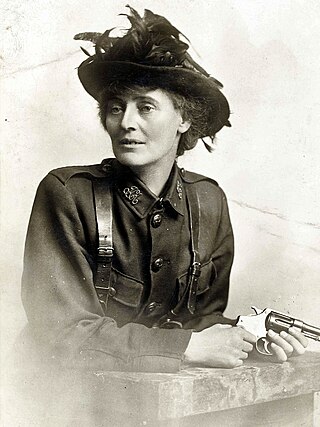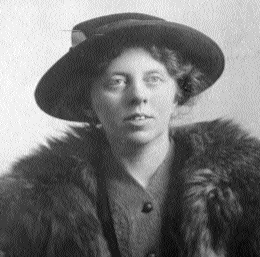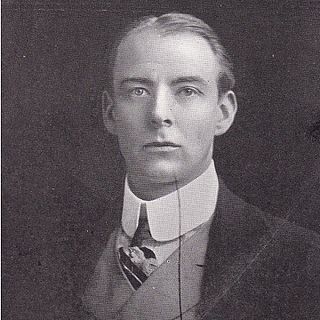
Louth is a market town and civil parish in the East Lindsey district of Lincolnshire,England. Louth serves as an important town for a large rural area of eastern Lincolnshire. Visitor attractions include St James' Church,Hubbard's Hills,the market,many independent retailers and Lincolnshire's last remaining cattle market.

Frederick William Pethick-Lawrence,1st Baron Pethick-Lawrence,PC was a British Labour politician who,among other things,campaigned for women's suffrage.

Oldfield is a small hamlet within the county of West Yorkshire,England,situated north of Stanbury and near to Oakworth. It is approximately 6 miles (9.2 km) west of the town of Keighley. It mainly consists of farmland and has panoramic views across the Worth Valley towards BrontëCountry. Top Withens,the house featured in the novel Wuthering Heights,is clearly visible.

Emmeline Pethick-Lawrence,Baroness Pethick-Lawrence was a British women's rights activist and suffragette.
Irene Mary Bewick Ward,Baroness Ward of North Tyneside,was a British Conservative Party politician. She was a long-serving female Member of Parliament (MP),the longest serving female Conservative MP in history. She later became a life peeress in the House of Lords,and had served a total of 43 years in Parliament.

Thomas Wintringham was a British Liberal Party politician. He was elected as Member of Parliament (MP) for Louth in Lincolnshire at a by-election in June 1920,but died in office the following year,aged 53. He died suddenly in the House of Commons reading room in the Palace of Westminster.
The 1920 Louth by-election was a parliamentary by-election for the British House of Commons constituency of Louth in Lincolnshire. Voting was held on 3 June 1920. The by-election took place five days after the Louth Flood of 29 May 1920 had claimed 23 lives.
The 1921 Louth by-election was a by-election held on 22 September 1921 for the British House of Commons constituency of Louth in Lincolnshire.
Lieutenant-Colonel Sir Arthur Pelham Heneage was a British Conservative Party politician.

Dame Margery Irene Corbett Ashby,was a British suffragist,Liberal politician,feminist and internationalist.

The representation of women in the House of Commons of the United Kingdom has been an issue in the politics of the United Kingdom at numerous points in the 20th and 21st centuries. Originally debate centred on whether women should be allowed to vote and stand for election as Members of Parliament. The Parliament Act 1918 gave women over 21 the right to stand for election as a Member of Parliament. The United Kingdom has had three female Prime Ministers:Margaret Thatcher (1979–1990),Theresa May (2016–2019),and Liz Truss (2022). The publication of the book Women in the House by Elizabeth Vallance in 1979 highlighted the under-representation of women in Parliament. In more modern times concerns about the under-representation of women led the Labour Party to introduce and,decades later,abandon all-women short lists,something which was later held to breach discrimination laws.

Ray Strachey was a British feminist politician,artist and writer.

The 1918 Keighley by-election was a parliamentary by-election held for the House of Commons constituency of Keighley in the West Riding of Yorkshire on 26 April 1918.

Helen Miller Fraser,later Moyes,was a Scottish suffragist,feminist,educationalist and Liberal Party politician who later emigrated to Australia.

Catherine Elizabeth Marshall was a suffragist and campaigner against conscription during the First World War. She moved from women's votes to peace and worked in Geneva supporting the League of Nations.

Dame Kathleen D'Olier Courtney,DBE was a leader in the suffragist movement in the United Kingdom.

Henry Devenish Harben was a British barrister and Liberal Party politician who later joined the Labour Party. He was a notable supporter of women's suffrage.
Dame Mary Guillan Smieton,DBE was a British civil servant. She served as Permanent Secretary in the Ministry of Education between 1959 and 1963,only the second woman to achieve the rank of Permanent Secretary. Prior to this,she was Permanent Under-Secretary at the Ministry of Education,having joined the civil service in 1925. She studied at Bedford College,London and Lady Margaret Hall,Oxford.
The Electrical Association for Women (EAW) was a feminist and educational organisation founded in Great Britain in 1924 to promote the benefits of electricity in the home.
Bertha Brewster was a British peace activist and suffragette who achieved fame with her letter to the Editor of The Daily Telegraph in February 1913. She was arrested five times,imprisoned twice and received the Hunger Strike Medal from the Women's Social and Political Union (WSPU).














